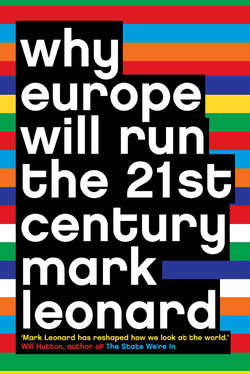Читать книгу Why Europe Will Run the 21st Century - Mark Leonard - Страница 10
Reversing the Balance of Power
ОглавлениеIf Europe’s peaceful twenty-first century will benefit from the wisdom of an American banker, the horrors of the first of half of the twentieth century can be traced back to a banker from Italy. The man in question was Lorenzo de’ Medici, whose family ran Florence in the fifteenth century. At that time it was one of five city-states that dominated the Italian peninsula – along with Rome, Naples, Venice, and Milan. These cities were immensely wealthy and in perpetual competition: at that time Florence had a higher annual income than the King of England, while Venice’s revenue was double that of England and Spain.9 In 1454, Francesco Sforza, the ruler of Milan, approached de’ Medici to propose an alliance between their two states. He wanted to gang up on Venice before it grew too powerful. De’ Medici agreed, but insisted that they must not destroy Venice as one day its power might itself be needed to stop Rome. His reply contained the historic phrase: ‘the affairs of Italy must be kept in balance’. He is credited with being the first person to talk explicitly of a ‘balance’ of power, a principle that became one of the key foundations of European order (or disorder) for five hundred years.10 The system was based on the mechanical idea that groups of states needed to be brought into equilibrium – like the scales that bankers used to measure gold – so that no single one could dominate the continent.
Europe’s invention of small nation-states – and a system to stop any one of them overpowering the others to create an empire – was a mixed blessing. The fierce competition between them spurred them on to develop the most advanced technology in the world, and allowed a continent that was a sleepy backwater to overtake the empires of the East and assume global dominance.11 But the logic of the balance of power was also perpetual war: the Thirty Years War, the Franco-German War, the First World War, the Second World War, and the Cold War were all fought to stop any one country rising to hegemony.
All that has now come to an end in Europe. No one fears a rising Germany or France because all the countries of Europe have formed themselves into a network that is bound together by laws and regulations.12 Instead of competing with each other to build up arsenals of weapons or build regional alliances, their interests are defended through mutual vulnerability, pooled sovereignty, and transparency. But outside the warm womb of the European Union, the balance of power lives on: between India and Pakistan, in the Middle East, in Central Asia, and the Far East.
Although these countries are all trying to balance each other, no one is trying to check Europe’s rise. In fact, Europe has even managed to reverse the very idea of the balance of power. As its strength grows, it is becoming a powerful magnet for its neighbours who want to join it rather than balance it. The American political economist Richard Rosecrance has shown that this is the first time in history that a great power has arisen without provoking other countries to unite against it. In a remarkable survey of the formation of empires and states he shows how every major power from Spain in the sixteenth century through France, Britain, and the United States in the nineteenth century to Germany, Japan, and the Soviet Union in the twentieth century and the USA in the twenty-first century has provoked its neighbours to unite against it.13 So why has Europe managed to become more united and powerful without attracting hostility?
One argument is that Europe is an economic rather than a political superpower. Walter Russell Mead argues that economic might draws people in while political power creates hostility. He explains this theory by comparing economic power to the carnivorous sundew plant: ‘a pleasing scent lures insects towards its sap. But once the victim has touched the sap, it is stuck; it can’t get away. That is sticky power; that is how economic power works.’14 There is something in the claim that economic power doesn’t create the same fears in its neighbours as political power, but it does not explain why the United States, China, Russia, and India look more benignly on the growth of the European economy than they do on each other’s economic development. There is an entire industry of US foreign policy thinking based on the need to balance China’s growing economic power, even though by some definitions its economy is still smaller than Italy’s, but there is very little concern about a European Union whose economy is the largest in the world.
The most compelling explanation comes from the unique nature of the European Union: as a network rather than a state. International relations scholars have compared the relationship between states to billiard balls on a table. They have a hard shell and repel each other when they clash. But while it is easy to clash with another state, it is difficult to clash with a network that is made up of a cacophony of different voices. The point of a network – or club – is that it doesn’t have a hard centre like a billiard ball, so when you try to balance it, you are often sucked into a process of engagement with its different members. The most surprising example of this was the crisis in Iraq.
